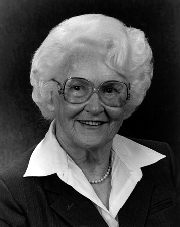Margaret Collins Schweinhaut
1904-1997

Former State Senator, Margaret "Peg" Schweinhaut was active in political and public affairs for over 50 years. Retired from the Maryland State Senate in 1991, she contributed greatly to Montgomery County and the State of Maryland.
Peg Schweinhaut is a native of Washington, D.C. She began her political career as a school and community activist. As early as 1948, Ms. Schweinhaut was active in Montgomery County politics; she was involved in the successful effort for charter government for the county. Her reputation as a State legislator began in 1954 with her election to the House of Delegates. She served as a Delegate until appointed to the Senate in 1961. Her career in the State Senate spanned 25 years (1961-63, 1967-1991).
Senator Schweinhaut conducted her political work under the precept that the first and most important role of government is to help those least able to help themselves. Her legislative records reflects this principle. Senator Schweinhaut's commitment to improving the quality of life for Maryland's elderly began with her first political term in 1955. Through her urging, Governor J. Millard Tawes appointed a State Commission on Aging in 1959, and named Schweinhaut as the commission's Chair. Under her guidance, the Commission studied how state and medical facilities, particularly nursing homes, treated the elderly. As a result, the State Assembly has passed eleven bills to affect the State's response to issues affecting the elderly. Schweinhaut is proudest of the bill that prevents nursing homes from releasing patients when they can no longer pay for services. Montgomery County recognized her dedication to the County's older population by renaming the Forest Glen Senior Center in her honor: The Schweinhaut Senior Center.
Besides her concern about the rights of the elderly, Peg Schweinhaut was responsible for legislation affecting other human rights issues. The sale of drug paraphernalia is now banned; previously, even though drug use was illegal, the sale of paraphernalia was not. Senator Schweinhaut also developed the bill for Maryland's public defender system. In addition, she led the way for legislation that prevents capital punishment of retarded citizens convicted of crimes.
Margaret Schweinhaut continues to be involved in the community and the Democratic Party. She is a living example of how women can succeed in the male-dominated political structure. She is a model for future legislators and all active women.
